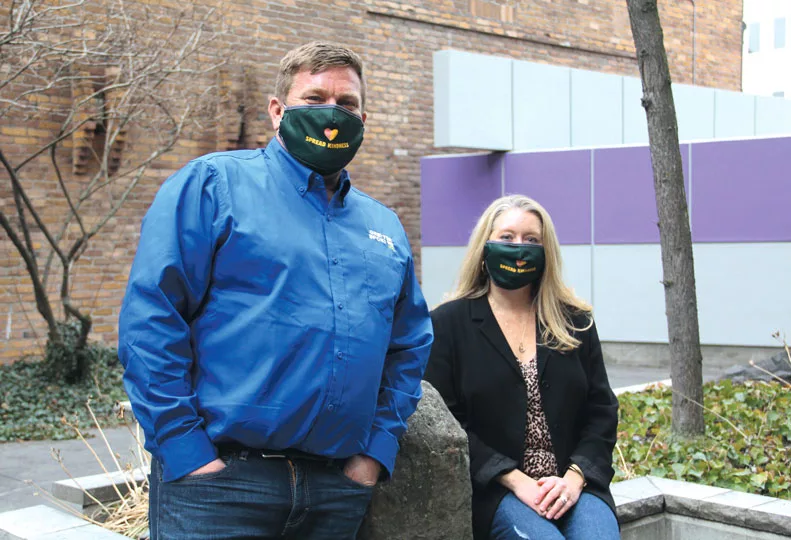Startup Spokane retools, plans library partnership
GSI program to market services countywide after period of dormancy

After a period of dormancy, StartUp Spokane is gearing up to return to action by expanding its services and partnering with Spokane Public Library.
Gary Ballew, vice president of economic development at Greater Spokane Incorporated, says StartUp Spokane was put on hold and its coworking space was permanently shut down while the business development organization focused its efforts on responding to the effects of the COVID-19 pandemic and related state-mandated restrictions on Spokane’s businesses.
“Our efforts really turned to personal protective equipment distributions and assisting our partners on grant programs where dollars were going out to local businesses,” Ballew says.
Now, Ballew says, GSI is returning its attention to programs such as StartUp Spokane.
GSI serves as the combined chamber of commerce and economic development council for Spokane. Startup Spokane, a program of GSI, offers events, guidance, and resources to entrepreneurs in Spokane County.
“I consider it tacking into the wind, because we still have COVID. We still have the impacts on businesses,” Ballew says. “But we’re trying to get our efforts back to our pillars of economic development—our startup program, our business retention and expansion program, and our recruitment program.”
Ballew says he and Jessica Kirk, GSI’s director of business retention, expansion, and startup, currently handle most of the startup program. Ballew and Kirk currently are working to transition StartUp Spokane’s Entrepreneur Connect interview series — which Ballew describes as “ask an expert” — to an online format.
“At some point, we’d like to get back to the networking, but it’s going to be awhile before we can group people together,” Ballew says.
Mark Pond, business research librarian at Spokane Public Library, says GSI and the library have been working on plans to operate the StartUp Spokane program jointly.
Pond says he will help connect fledgling businesses with agencies, tools, and resources, while Ballew and Kirk will continue to manage StartUp Spokane’s events, programming, and website.
GSI, located at 801 W. Riverside, is about a block away from the downtown branch of the Spokane Public Library, at 906 W. Main.
As previously rep–orted by the Journal, the three-story, 117,000-square-foot downtown branch is undergoing renovations and is expected to reopen in spring 2022. Pond says the renovation project includes moving the library’s Level Up entrepreneurial space to the ground floor from the third floor.
“We’re still working on the logistics of this, but the plan is that with the space being on the ground floor, we could code your library card for 24/7 access for businesses,” Pond says.
Granting 24-hour access to entrepreneurs would enable businesses to take advantage of the coworking space and business resources after-hours, he says.
“The Bloomberg terminal, for example, is a $27,000-a-year tool, and to have it locked up and inaccessible (when the library is closed), it doesn’t seem like we’re getting the highest possible return out of that,” Pond says.
The library’s business-focused space also will offer some new tools, such as the Risk Management Association financial ratios database, which will be partially funded by community service nonprofit Spokane Neighborhood Action Partners.
Risk Management Association is a financial professional association, Pond says.
“(Members) can take their clients’ data, they anonymize it, and then they hand it over to RMA so that RMA is able to release industry averages,” he says.
Pond says the RMA database is often used by commercial lenders to determine whether to extend a business a line of credit.
Ballew says that while Pond handles new StartUp Spokane members, he and Kirk will focus on marketing the program to entrepreneurs throughout Spokane County.
“We’re looking for opportunities to provide the same services and making sure we’re reaching out to some of the other communities,” Ballew says. “We want to expand the virtual nature and focus less on physical space.”
He and Kirk plan to market StartUp Spokane in “third spaces” in rural communities.
“You have work, you have home, and then you have a third space. That could be a library, or it could be a coffee shop,” Ballew explains.
Ballew says an example of such a space is Deer Park’s coworking space, called The Hotspot at Deer Park, which opened in November.
At the time Startup Spokane’s coworking space in the Plechner Building, at 608 W. Second, was established in 2014, there were no other coworking space options for entrepreneurs here, he says.
Ballew says that by 2020, it became clear to GSI that there were enough coworking spaces in the Spokane area to serve the needs of the startup community. GSI moved StartUp Spokane out of the building in July.
The Plechner Building became home to StartUp Spokane when three Spokane business developers and investors — Tom Simpson, Rob Martinson, and Chip Overstreet — bought the 9,400-square-foot structure.
The Plechner Building has history of entrepreneurial connections.
In 2007, Spokane businessman Steve Salvatori founded the Spokane Entrepreneurial Center, which included the Plechner Building and Lorraine Building, at 308 W. First downtown, as a low-cost office space with shared amenities for business startups.
Most recently, the Plechner Building sold for $868,500 in November 2020 to R&D Schwartz Holdings LLC.
Related Articles
Related Products

_c.webp?t=1763626051)
_web.webp?t=1764835652)

